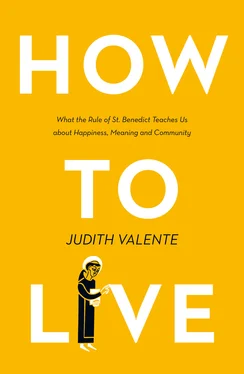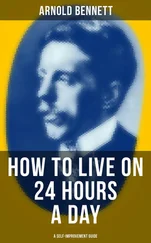I glanced over at the table I had been planning to use as a kind of altar. Someone had covered the table with a white linen cloth and placed an elaborate bronze crucifix in the center, along with a vase of fresh flowers.
“How do you like the way I fixed up the altar?” the woman said. “That crucifix there, that’s been in my family for generations.”
The woman I had been trying to avoid had brought the altar cloth, the flowers, and the crucifix. She not only decorated the altar, she had also brewed the coffee and baked a cake—the only cake anyone had brought to share.
I learned her name was Eva. On the second night of the retreat, Eva brought some poems she had written. One was a loving chronicle of the characters she meets on her weekly pilgrimages to the Dollar General. My husband and I thought the poem was so moving, we asked Eva to read it to the retreat group. It was early spring, and Eva talked about being an avid gardener. She said she wakes at dawn to look for new shoots beginning to break through the soil. They remind her that every day nature is renewing itself, and so are we. I soon figured out that any wisdom anyone was going to take away from the retreat wasn’t going to come from my husband or me, but from Eva.
We returned home from Alabama a few days before Easter. Two cards were waiting in the mailbox. One was an Easter card from my sister. The other was from Eva.
“Hope you all have a blessed Easter,” Eva wrote. “I think of you two often. Writers are like gardeners. They both grow things. When I lose someone close to me now, I don’t send flowers anymore. I write a poem for the family and frame it. Poems last longer.”
Who are the wise ones in our lives—like my father, like Eva? Whose words to us have been difficult to hear? Are we missing a message within the message? Are we listening with the ear of the heart?
 In his wonderful poem “I’m Going To Start Living Like A Mystic,” the poet Edward Hirsch talks about walking silently, listening and observing attentively. This week, how can I consciously practice less talking, more listening?
In his wonderful poem “I’m Going To Start Living Like A Mystic,” the poet Edward Hirsch talks about walking silently, listening and observing attentively. This week, how can I consciously practice less talking, more listening?
 Justice Sotomayor says listening is the key to preserving relationships. How harmonious are my relationships with the people with whom I live and work? What are some of the “operator errors” in listening that have occurred between us? How can I make them right?
Justice Sotomayor says listening is the key to preserving relationships. How harmonious are my relationships with the people with whom I live and work? What are some of the “operator errors” in listening that have occurred between us? How can I make them right?
 Were there times in my life when listening deeply to a disappointment or setback, like the ones Sisters Joan and Irene suffered, helped me strike out in a new direction, or reignited a passion?
Were there times in my life when listening deeply to a disappointment or setback, like the ones Sisters Joan and Irene suffered, helped me strike out in a new direction, or reignited a passion?
 What is disappointment trying to teach me today?
What is disappointment trying to teach me today?
 Who are the unexpected prophets hidden in plain sight of my life? Am I paying attention to what they have to say, even if it is something I might not want to hear?
Who are the unexpected prophets hidden in plain sight of my life? Am I paying attention to what they have to say, even if it is something I might not want to hear?
3
RUN WITH THE LIGHT
On Waking Up
Let us get up then, at long last, for the Scriptures rouse us when they say: “It is high time to arise from sleep.” (Rom 13:11)
—FROM THE PROLOGUE
There is a wonderful scene in the novel Zorba the Greek in which Zorba tells the young foreman he’s befriended about meeting a ninety-year-old man who planted an almond tree.
“What, Grandfather, planting an almond tree!” Zorba exclaims, guessing the old man won’t live long enough to see the tree bear fruit.
“My son, I carry on as if I should never die,” the old man says.
Zorba replies, “And I carry on as if I was going to die any minute.”
“Which of us was right, boss?” Zorba asks the young foreman.
I tend to agree with Zorba. I like to think I try to live my life fully, as if I might die any minute. In college, I had a writing professor named James C. G. Conniff who routinely railed about students he felt were sleepwalking through life. The Jesuit writer Anthony de Mello writes, “Most people, even though they don’t know it, are asleep. They’re born asleep, they live asleep, they marry in their sleep, they breed children in their sleep, they die in their sleep, without every waking up. They never understand the loveliness and the beauty of this thing we call human existence.” Even a long life is no guarantee that any of us will ever awaken from our emotional stupor.
That same sense of urgency to “wake up!” permeates the Benedictine Rule. It is especially pronounced in the early chapters. We need to get serious, St. Benedict seems to be saying, about living what the poet Mary Oliver calls our “one wild and precious life.” Action verbs prevail here.
Let us open our eyesto the light that comes from God …
The Lord waits for us daily to translate into actionhis holy teachings …
Let us set outon this way with the Gospel for our guide …
We will never arrive unless we runthere by doing good deeds …
Are you hasteningtoward your heavenly home? …
And one of my favorite lines in all of The Rule:
Runwhile you have the light of life, that the darkness of death may not overtake you.
Yearn. Love. Pray. Renounce. Respect. Live. All words that pop up early on in The Rule .
Most mornings, I rise around 4 A.M. to the sound of a thwack against our front door. It is the signature of Lauren or Junie, one of our two paper carriers, carrying out a line of work that one day soon will likely go the way of the milkman, the TV repairman, and the doctor who made house calls. Sometimes I am swift enough and awake enough to open the door and give one or the other a greeting. That never fails to startle them, accustomed as they are to seeing only dark and silent houses at that hour of the morning. I used to just scoop up the New York Times and dash back inside. But lately I’ve taken to lingering outside for a few minutes. I survey our front yard, the other houses on the block, and the sky at that moment when the birds begin their morning calls. The moon is still stationed overhead, and daylight is starting to creep onto the horizon.
I witness some strange and wonderful sights. Once it was a skunk exiting from between two bushes. It must have been a polite skunk, as I don’t recall it leaving behind its traditional calling card. Often there are rabbits romping across the grass. They become quite still at my arrival, as if they are imitating statues. Other days, a snake or a slug on the front step. One morning I will never forget, I happened to look up just as a shooting star streaked across the sky. I felt so lucky to have been watching at that precise moment. I should say here that our house isn’t in the middle of some prairie. It sits in the heart of a university town, so a shooting star or undomesticated animal isn’t something you are likely to see. Unless, of course, you’re paying attention.
On my first visit to the Abbey of Gethsemani in Kentucky, I wanted to savor the entire experience. I was determined to wake up in time for the 3:15 A.M. Vigils, the first prayers of the day. My room wasn’t in the regular retreatant’s quarters attached to the abbey, but rather on top of a hill overlooking the monastery in what the monks call the Family Guest House. I had to walk about five minutes down the hill to get to the abbey church. One morning I stepped outside my room before dawn and saw an amazing sight. The entire southern edge of the sky was awash in stars. I felt as if I could step inside this doorway of starlight. One of the monks, Brother Paul Quenon, told me later I had been looking into the Milky Way. He pointed to a solitary, bright star suspended in an opposite direction—the planet Venus. Suddenly the reason for waking up that early acquired a whole new dimension. The candlelit prayers in the abbey chapel and the chanting of the Psalms provide a wonderful, soulful entry to the day. So do the magical sights you can behold at that time of morning when much of the world is still asleep.
Читать дальше

 In his wonderful poem “I’m Going To Start Living Like A Mystic,” the poet Edward Hirsch talks about walking silently, listening and observing attentively. This week, how can I consciously practice less talking, more listening?
In his wonderful poem “I’m Going To Start Living Like A Mystic,” the poet Edward Hirsch talks about walking silently, listening and observing attentively. This week, how can I consciously practice less talking, more listening?










